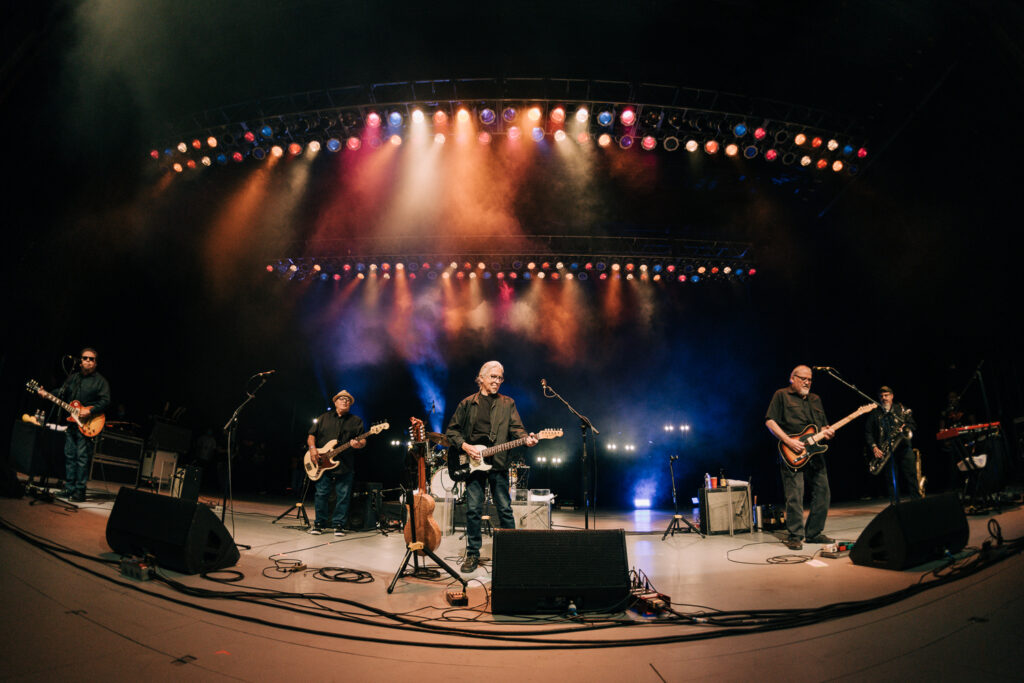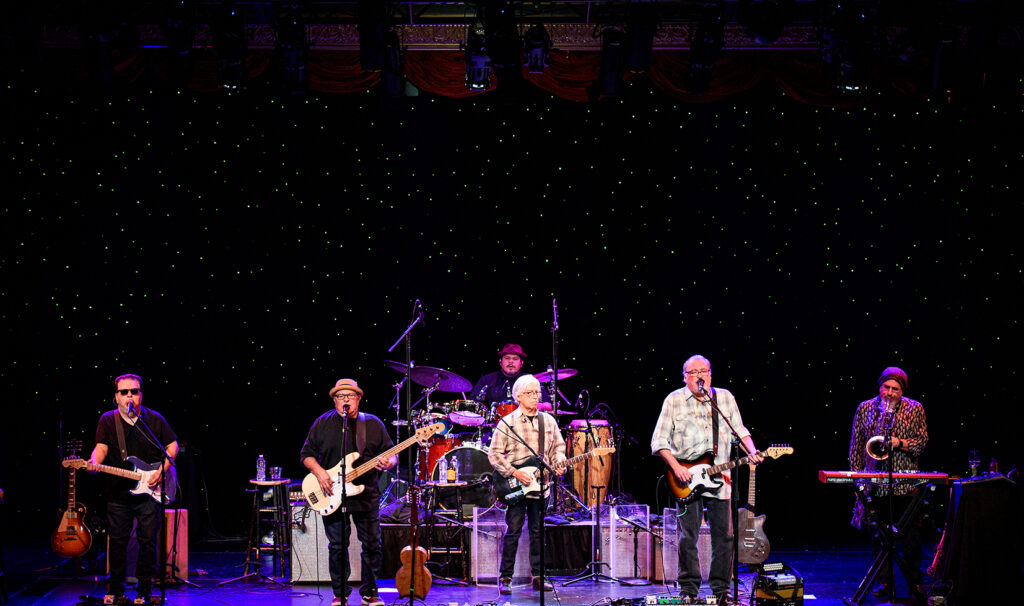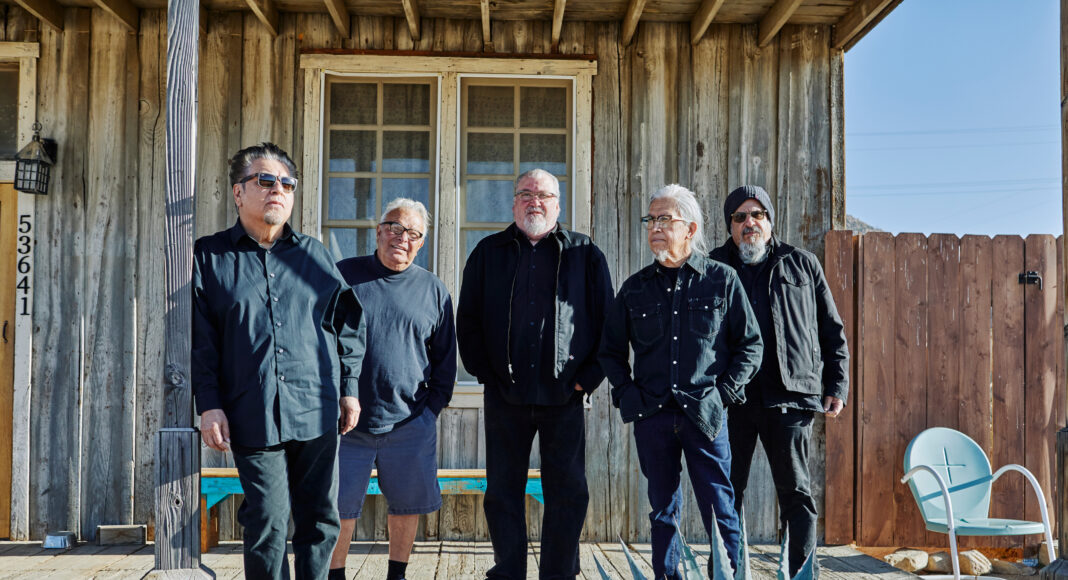A 28-minute mini-documentary from 1975, simply titled Los Lobos del Este de Los Angeles—also the band’s original name—opens with six young guys in flannel shirts and jeans performing a traditional Mexican folk song atop a littered hill overlooking East L.A.
The sound and image quality are rough, mainly due to the home video equipment at the time. However, the essence of Los Lobos comes through beautifully. The melodies of the various stringed instruments and vocal harmonies carry you away to another place, another time.
The music continues as the scene cuts to images of everyday life throughout East L.A. neighborhoods—kids ride bikes across abandoned lots, vendors push flower carts and cars speed down Atlantic Boulevard. The music fades, giving way to a voiceover from Los Lobos co-founder Francisco González, who was 21 then.
“About two years ago, we got together—not for business gain or any money—to learn some songs to play for our mothers, to show them we appreciated the music of our culture,” González says.
They learned how to play their instruments by listening to old records and were approached by many, which kept the group going. “Now, we feel it’s an obligation to spread our culture to other people who don’t know about it. We play 15 different instruments from regions all over Mexico.”
González left Los Lobos just two years after the band formed to pursue different interests—he learned Veracruz harp, then became El Teatro Campesino theater group’s musical director.
“We want to make true Chicano music that draws from our past, that is in line with the past, the present and hopefully the future,” González adds.
Upon González’s passing in April 2022 from cancer, the band expressed their gratitude for the former member paving the way for the band to “create a sound that blended all of the styles they love: rock and R&B, surf music and soul, mariachi and música norteña, punk and country.”
For the outfit’s first seven years together—before they shortened their name—they were an all-acoustic, drummerless quartet who stuck to playing traditional Mexican folk tunes like the one in the 48-year-old documentary.
Incidentally, the title of that little movie was also used as the title of the band’s 1977 debut, which was recorded with little-to-no budget (there are a thousand known copies in existence, making it one of the rarest roots-rock vinyl). The record was reissued in 2000 as Just another band from East L.A. with the clinking bottles and background chatter still intact.

Though González’s time with the band was brief, his unofficial mission for the group has been a guiding light throughout Los Lobos’ career. It’s noticeable in their 1984 sophomore release, How Will the Wolf Survive? There’s significant genre crossover; everything from blues and country to rockabilly is present, but the Mexican roots of Los Lobos del Este de Los Angeles remain intact. “A Matter of Time” and the title track even delve into Mexican immigration issues that are still relevant. In 1989, the record placed No. 30 on Rolling Stone’s Top 100 Albums of the 1980s.
BORN IN EAST L.A.
The multi-instrumental crew—David Hidalgo, Cesar Rosas, Conrad Lozano and Louis Pérez Jr.—went from “just another band from East L.A.” performing “barrio parties” and backyard weddings to winning a Grammy for La Pistola y El Corazón, a tribute to Tejano (Tex-Mex music) and mariachi music in less than a decade. Also, within that time frame, Los Lobos’ unique multicultural-crossover sound catapulted them to the forefront of Los Angeles’ most popular bands of the time, which included X and the Blasters. But the group’s participation in the Richie Valens biopic in 1987, namely their upbeat interpretation of the film’s namesake “La Bamba,” brought them the international mainstream success that has yet to subside.
Los Lobos’ ongoing success can be attributed to adhering to several unsaid rules, starting with refraining from intentionally mixing their music with politics—for the most part.
“Sometimes [politics] get in the way of the music,” multi-instrumentalist Steve Berlin, who joined the band in 1984, says. “People tend to read an agenda into stuff when there really isn’t one. We try to be cautious about what we do, what we say, who we align ourselves with.”
Co-founding multi-instrumentalist Louis Pérez Jr. adds, “All we do is tell the truth. That’s it. It all began with learning a few Mexican songs to play for our moms. We never planned to do more.”
The sum of Los Lobos’ parts didn’t set out to become rock stars. They just wanted to play music. They worked hard and performed their best.
“I tell kids that if you want to be a musician, you have to love it so much that it keeps you up at night because there’s nothing else you could think of,” Pérez says. “But if you want to do it because you want to be a rich rockstar, then you’ll probably be disappointed. It will never let you down if you do it because you love it. It has to feel right.”
Not only does music keep Pérez up at night, but it also wakes him up, usually around 2am. Sometimes, it’s a lyric or a melody, something new that could become the foundation for Los Lobos’ next hit single. Other times, it’s a false alarm. That lyric or melody that Pérez thinks is genius at 2am doesn’t seem as stellar the next day.
“Sometimes, the next morning, I’ll wonder, ‘What the hell was that?’”
“Saint Behind the Glass” represents one of the times that Pérez struck gold during the witching hour. The intimate song, included on Los Lobos’ acclaimed 1992 record Kiko—arguably, one of their top three albums—features one of the rare times Pérez sings lead vocals over gentle finger-picking. It’s a tender breeze cradled by modest, simple, yet descriptive prose that brings you inside the song.
“Coffee in the air, coffee in the air/ Saint behind the glass, smells coffee in the air.
Curtains blowing ’round, curtains blowing ’round/ Saint behind the glass, sees the curtains blowing ’round.”
“It’s the most personal song I’ve ever written,” Pérez says. “That house that I describe is the house I grew up in—we slept in that one-bedroom; my mother, my sister and me. Those are beautiful memories. I wasn’t planning on singing it, but David chased me around the block a few times with the microphone.”
While Pérez wrote about his own experience and what he saw while growing up, it comes out with a universal appeal; the feelings and emotions aren’t provincial.
“I think everybody who puts pen to paper, hands on the keyboard, ultimately writes from an autobiographical place,” he says. “It’s a process: I sit down, try to come up with a title or something, and then I’m off and running. It’s a matter of moving the words around to see what I want to say. For the most part, it’s become intuitive.”
ABOUT A BOY
Pérez says music, art and reading saved his life. His father died when he was eight years old, and he never really had a chance to process the trauma.
“I lived in a very small bubble in East Los Angeles,” Pérez says. “The world could have been flat. Atlantic Boulevard and Third Street could have been the edge of Europe. To go anywhere, I had to use my imagination. And I think I escaped by walking down to the library and sitting on the floor between the rows of books, and I felt safe there.”
He recalls reading Steinbeck’s Travels with Charley: In Search of America. He felt invigorated each time he turned the page.
“It wasn’t just a travelog,” Pérez says. “It was also social commentary. Until I got a bike when I was 12, my neighborhood was the whole world. And these other poor kids [Los Lobos] in East L.A. grew up like I did and felt the same way. Can you imagine when we first went out on tour? We were driving through Iowa cornfields during wintertime. We had a joke: In Southern California, we keep the snowblower and the logs in the mountains.”
A big part of what helped shape Pérez as a musician and subsequently helped guide Los Lobos’ diverse sound stems from his lived era.
“I came up during the transformative ’60s,” he says. “There were so many things going on around us. The Watts riots, Vietnam, the assassination of President Kennedy, Robert Kennedy and Martin Luther King.”
When Pérez was 14, he had begged his mother for weeks to let him go to a Jimi Hendrix performance at the Hollywood Bowl. Finally, his mom gave in and arranged for an older neighbor to take him.
“That [concert] completely rearranged all my brain cells,” he says.
GOING BIG
When Los Lobos’ 2021 Native Sons was nominated for a “Best Americana Album” Grammy in 2022, the group quietly didn’t think they had a shot in hell. The competition was steep: Jackson Browne, John Hiatt with the Jerry Douglas Band and Allison Russell. None of the band members expected the win. And they were okay with that. They aren’t greedy; Los Lobos has already racked up 12 Grammy nods throughout their career—they’ve won three—including two for “Best Mexican-American Performance.” The appreciation is much more than they could have imagined when they began.
“I didn’t think we’re the frontrunners, but I appreciated the sentiment,” Berlin told me before the awards. “We already have a few [Grammys], so we’re good. It’s just nice to be in there somewhere.”

It was also thrilling to be nominated alongside Jackson Browne, whose song “Jamaica Says You Will” is one of the tunes Los Lobos plays on Native Sons. Still, as Berlin noted, none of the band members expected the win, making it much more exhilarating.
Pérez was driving with his wife when he got a call from his son.
“He said, ‘Dad, where are you?’” Pérez recalls. “I said I was on the 405 Freeway with your mom. He said, ‘You’re not in Vegas?’ No. ‘You’re not at the Grammys?’ No. ‘Well, you just won.’ Then the phone lit up. It was affirmation. Not that we need affirmation, especially as Chicanos living in the United States and growing up here.”
Pérez adds that while the awards are nice, Los Lobos’ drive comes from somewhere much more profound.
“It’s not necessarily the work we did, but the example that comes out of it—inspiring other people who intersect with our life path along the way, on this journey,” he says. “It’s the key to a legacy: someone can take from what we do and do something themselves.”
About a year ago, Los Lobos last performed in Santa Cruz. Rising East L.A. rockers Tropa Magica opened. Los Lobos usually doesn’t have the time to see every band that opens for them. However, the renowned Grammy Award winners made sure they made time to check out their opening act.
“We looked forward to hearing [Tropa Magica] play and meeting the band,” Berlin told me. “I’m a huge fan.”
Tropa Magica founders, brothers David (guitar, vocals) and Rene Pacheco (drums, vocals), have felt a connection to Los Lobos since they first heard them on the La Bamba soundtrack. There is also that East L.A. bond.
“[Opening for Los Lobos] was a milestone marker for us,” David says. “We’ve been fans since we were kids, so it was super awesome to perform with them and meet them. It’s so cool.”
Tropa Magica’s approach to music is quite similar to Los Lobos—they use psych-rock, cumbia, stoner rock, Bossa nova, grunge, surf and even disco elements to create something uniquely their own. They call it “cumbia psychedelic-punk.”
50 YEARS
2023 will mark Los Lobos’ 50th anniversary. And they will be on stage in Santa Cruz when they reach this rare and remarkable milestone.
“Maybe it’s because we don’t want to think about it,” Pérez says. “You don’t want to think about what keeps an airplane in the air when you’re up there at 35,000 feet.”
Pérez thinks the key is that they came together as friends long before they were a band and grew up in the same East L.A. neighborhood.
“If you hang around a barbershop long enough, you’ll eventually get a haircut,” Pérez adds. “So, we were musicians hanging out together as friends who eventually started a band. We’re like brothers—sure, we’ll arm wrestle now and then. It’s natural. But the relationships, especially with David and I, that’s the glue that holds the musical and songwriting relationships together.”
It’s not lost on Pérez just how big of a deal this landmark is for Los Lobos. Aside from the Rolling Stones and Bruce Springsteen and the E-Street Band, there are very few examples of this achievement. It’s even more impressive that all the initial founders are still in the group, except González—Berlin has been with the band for 40 years, and drummer Alfredo Ortiz took over for Enrique “Bugs” Gonzalez, who returned to Mexico a couple years ago.
“Last year, we had all these crazy ideas about doing this and doing that,” Pérez says. “Everybody’s excited about turning 50; then you realize that you just want to take a nap—everything would take so much work. So, we’re going to be diplomatic and see what everyone has in mind, then collectively come up with ideas to celebrate. You’d think this would have all been planned, but it’s typical; we always say that the Los Lobos clock doesn’t have any hands on it. We don’t run on conventional time. We have some ideas of what we want to do, and we will have a great time celebrating.”
Beyond 50? Pérez isn’t sure yet what Los Lobos’ plans are. He does say that touring will have to slow down a bit. After being on the road and performing night after night consistently for five decades, there’s some wear and tear. Pérez references a recent Howard Stern interview he saw with Springsteen.
“[Springsteen] was sitting on a stool with a guitar, and there’s a piano a few feet away,” Pérez begins. “He’s talking about all this stuff; then he plays a song. Then he gets up and walks over to the piano [slowly]. I felt like, ‘wow, I know how that feels.’ All those road miles on his back—you can tell. That just illustrates that we’re looking at time as it evaporates. We’re not getting any younger. We’re going to think hard about how we want to continue [Los Lobos].”
Pérez, who turns 70 in January, aims to have more time to volunteer and serve young people directly. He says it’s just another way for him to express himself creatively—it’s also a way to give back.
Meanwhile, Los Lobos guitarist César Rosas has become known for telling audiences, “Thank you for still liking us.”
It sounds like Rosas will be offering a few more thank yous, at the least, before Los Lobos bids us farewell.
Los Lobos (Mattson 2 opens) performs Saturday, Dec. 31, 9:30pm. $85.05 plus fees. Rio Theatre, 1205 Soquel Ave., Santa Cruz. folkyeah.com.















What a beautiful feature and interview, Adam. Such candor. Thank you!
These artists have been so deep in our hearts for so long. I hear my father singing, my grandpa, always.
Btw, here’s the link to the documentary you mentioned, that for me, IS the seventies in East LA: https://youtu.be/sfpdejgOBpk
What a beautiful story. Thank you.
Was the Hendrix show @ the Bowl Louie attended the one included in the 50th Anniversary Edition of Electric Ladyland?
I enjoyed this article very much. We have seen Los Lobos many times and in several different states. We are from the same generation as they are and we hope to see them perform many more times. If they show up, we’ll show up!!